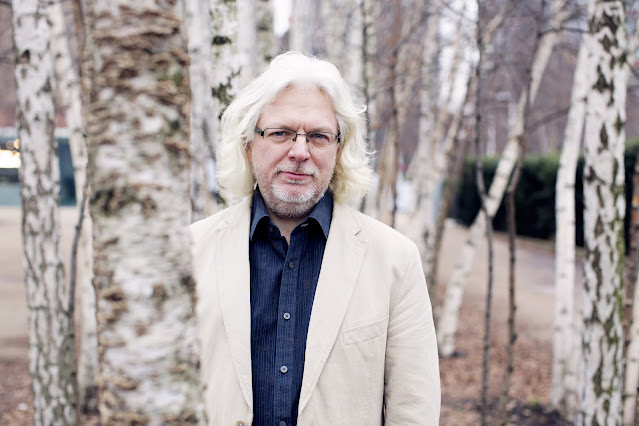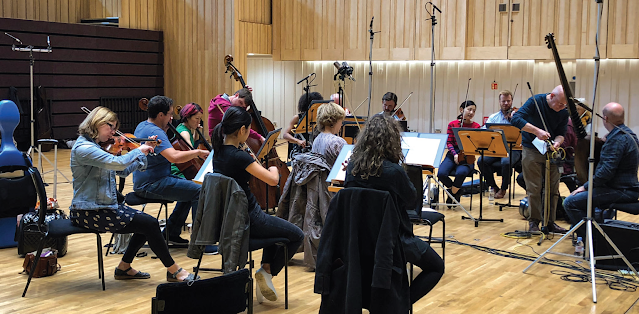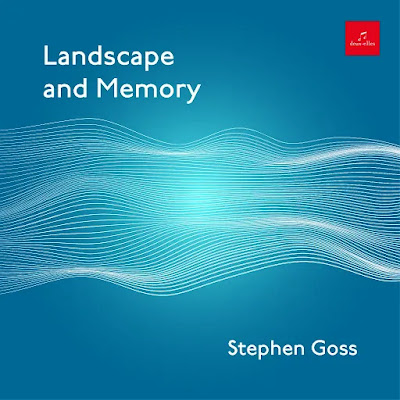 |
| Stephen Goss |
Composer Stephen Goss has a new triple album out, Landscape and Memory on Deux-Elles, which showcases his recent work and celebrates his 60th birthday. The disc includes everything from music for solo guitar to his Theorbo Concerto, not to mention his Intermezzi for romantic guitar and fortepiano, along with one or two older recordings such as John Williams (guitar) and the Royal Philharmonic Orchestra, conducted by Paul Daniel, in Stephen’s 2012 Marylebone Elegy, in all 19 works in all.
In fact, the project started as an idea for a single album. Stephen tends to work on a project basis, writing a work, touring it, and recording it, but with no album in mind. The idea was to assemble the recordings of works from the last ten years into an album. It was all planned, but the pandemic delayed things. Matthew Wadsworth, who runs the record company Deux-Elles, suggested adding other recordings, including older work, the recording of Stephen’s 2018 Theorbo Concerto, written for Wadsworth, as well as a recording from Stephen’s days playing in the Tetra Guitar Quartet, thus making the discs something of a retrospective. There was originally no grand plan, the programme developed thanks to encouragement both from performers and from the record company, as well as some pieces being recorded specially.
The title Landscape and Memory not only suits the album but suits Stephen’s music, referring to things that are important to him, time and place, distant and close by, nostalgia, and quotation. The phrase Landscape and Memory comes from a Simon Schama book of that name from the 1990s where Schama considers how human society developed in three different landscapes, rivers, mountains and forests.
Stephen’s fondness for reference and for quotation partly comes from his writing from a player’s perspective, he has never lost the connection to being on stage as a guitarist himself. Stephen finds that using quotations and stylistic references helps to draw people in so that you get them to listen to new and unfamiliar repertoire. He is also known for his music for guitar, but this was not a deliberate strategy, it is just how his career has developed. As he became more well-known, he developed a place in the guitar world. He feels that it is hard writing for non-guitarists as it is harder to find your place in the canon. The guitar canon tends to be highly dynamic with many performers bringing a creative element to their programmes. The nice thing about the guitar world is that the repertoire is not fixed, there is always new repertoire coming along and becoming a new part of the repertoire. Many works are presented in transcriptions or arrangements. Stephen sees the guitar world as having more momentum and more change, which he finds a positive thing. This is very different from, say, the piano world with its more fixed canon; it is harder to find your place in this world.
The disc also celebrates the collaborations that Stephen has developed with performers on the disc and people he has worked with over the years. He enjoys open collaborations with creative musicians, and people who help contribute to creating a new work. Many of his favourite collaborators are on the album, people who have played his music and are interested in it as they perform it. Now, when writing for new people, Stephen thinks more about the people with whom he will be collaborating.
Despite being a guitarist himself, Stephen engagingly comments that the guitar is annoyingly difficult to write for and that creating anything like contrapuntal music is done largely by sleight of hand. It is limiting to write for the instrument, everything is easier when writing for other instruments if you want music that can live and breathe. With the guitar, you are always brought back to its limits, to the idiom. But Stephen admits that this can be a strength as well, and he likes the sense of particularity in the idiom on any instrument. Though now, it has come to the point where he is writing for particular guitarists’ techniques, and they are all different.
He still feels that performers are higher in the food chain than composers, after all without the performers there would be no music, and Stephen is always grateful to performers for their creative ideas. Guitarists have always improvised and even composed, so there is a creative base on which to work which is not necessarily there in other musicians. The sense of collaboration, almost co-creation, is important to Stephen along with the pressure of the deadline for the commission. For him, it is all about the show. He stops writing if no-one is performing his music and did not write a note during COVID, though he admits that others see things differently.
His music is stylistically varied, and he finds the idea of having a uniquely recognisable style can be incredibly restricting. He could not remain stylistically in one place, describing it as simply writing the same thing over and over again, quoting WH Auden who said that an artist spends the first half of his career copying other people and the second half copying themselves. He points out that many great artists were chameleons but with a genius like Stravinsky, whatever the style, you know it is his music after two or three notes. With Stephen’s music, you might listen to different works without knowing they were by the same composer; this is something that he does not mind. He writes music to commission, for a particular purpose; for him, it is important to know what the players want. He hates being told it’s entirely up to you.
He lists three goals when composing, not to repeat himself, to have fun and to make music with people.
Though there are orchestral works on the disc, the repertoire mainly concentrates on chamber pieces and solos. Partly this is a matter of economics, orchestral music is expensive. He has written several popular guitar concertos; his 2012 Guitar Concerto was toured and recorded by John Williams. These works all use a classical guitar that is amplified, which Stephen feels is a necessity; he refers to early stories of acoustic performances of guitar concertos being a disaster. Amplified well and at the right balance for the orchestra, this means he can write for the guitar but assume it is a bit louder. Providing, of course, that the amplification is not overdone. The opposite is just as bad, with the guitarist having to force the sound when playing acoustically, this sounds horrible and an amplified instrument has a greater colour range.
 |
| Scottish Chamber Orchestra & Matthew Wadsworth at the recording session for Stephen Wadsworth’s Theorbo Concerto |
The theorbo concerto also featured an amplified instrument, and for the recording, the microphones were picking up the amplified sound. Writing for the theorbo proved to be extraordinary. It has a crazy tuning. Because originally it was not feasible for the top two strings to be long enough (as they were gut), they, in fact, sound an octave lower, so the highest string is the third one. The strings almost cover a diatonic scale, but not in the right order! When writing for the instrument, he ended up restringing a guitar to be like a theorbo, then improvising to see what was possible, to find out what went where.
Another big challenge was that the soloist for whom it was written, Matthew Wadsworth is blind which meant that he absorbed the music via midi files, braille music and Zoom sessions with Stephen. Of course, Wadsworth had to memorise the whole thing, made harder by the fact that there is a lot of writing for theorbo in the concerto that a player of traditional theorbo music would not be used to. But Wadsworth really put the work in. The piece was premiered in 2018 at the third Altamira Hong Kong Guitar Symposium. The UK premiere was given by Wadsworth and the Scottish Chamber Orchestra at the North York Moors Chamber Music Festival in August 2018. Wadsworth has played the work a lot subsequently, as Stephen comments, once learned you do not want to simply perform the piece once. Stephen has also done a very successful version for theorbo and string quartet.
Other large-scale works coming up include new works for two guitars and strings (in February 2025), for guitar and wind ensemble (in Spring 2025), as well as an orchestration of a piece by Astor Piazzolla. He feels lucky that several of his larger scale works, including his concertos have been recorded, not just the guitar concertos but his Piano Concerto was recorded by Emmanuel Despax on Signum Classics.
Stephen feels he has always been composing. At the age of eight, his teacher showed him three notes on his guitar and he returned to the next lesson having made up tunes. He grew up in South Wales where there was a lot of good music in state schools, and he had a lot of motivated friends. He wrote music for himself and his friends; at the age of eleven, he had a terrific compulsion to write, pieces that he now calls terrible. He did perform but he always felt that this was a second string to composing and when he played in the guitar quartet, they performed a lot of his music.
At the age of sixteen, he got a scholarship to study at Wells Cathedral School. He went to do violin, voice and guitar, but his violin playing was not quite to standard and it became his second instrument to guitar, where his playing was way better. He admits that he has always tended to be the odd one out, playing the guitar a lot when he was studying composition, and vice versa. He likes being the only composer in the guitar room and feels that few composers now are generalists, most specialise and are in their own little world.
 |
| Tetra Guitar Quartet (Stewart French, Stephen Goss, Carl Herring, Graham Roberts) in 2013 |
Now, he also enjoys being useful, helping and nurturing young composers and guitarists, this has become more central to his work (since 2020 he has been Professor of Composition in the Department of Music and Media at the University of Surrey). He sees this as passing on the baton, his role being to encourage risk-taking, bold creativity and thinking outside the box.
Guitar music tends to be accessible because popular styles sit comfortably on the instrument, and the musicians Stephen likes working with tend to be those who work across genres, classical, jazz and contemporary, and musicians who have enthusiasm for a variety of things. He finds himself interested in finding ways to get the public engaged in new music and more interested in mavericks. He mentions composers like Ludovico Einaudi, Karl Jenkins and Max Richter. He sees them as important voices in new music, they give big tours and fill auditoriums, and he likens this to the enthusiasm for Steve Reich in the 1980s when again Reich would fill halls. He finds the idea exciting. Whilst some people see such composers as selling out, as populist, Stephen feels that if you are enjoying listening to Ludovico Einaudi, Karl Jenkins or Max Richter, then they can be a way into other things. Composers have to be endlessly creative and adaptive to survive.
One of his heroes is the late Richard Rodney Bennett, who said that if no one needs your music then why write it? As far as Stephen is concerned, the audience is important. In academia, he sees a lot of art being mad and only seen by other academics, and he refers to a lecture given in the 1980s by Frank Zappa who asked what was the point of having a composition degree, its only use is to enable you to teach and spread the disease further.
Landscape and Memory: Stephen Goss
Royal Philharmonic Orchestra, Scottish Chamber Orchestra
ASAKA String Quartet, TETRA Guitar Quartet, SoloDuo
Paul Daniel and Benjamin Marquise Gilmore (conductor/director)
John Williams, Lorenzo Micheli, Matteo Mela, Aniello Desiderio, Zoran Dukic, Marco Tamayo, Alexander-Sergei Ramírez, Francisco Correa, Michael Partington, and Giacomo Susani (guitar)
Sheila Arnold, Graham Caskie, Bobby Chen, Michael Csányi-Wills, and Anthony Hewitt (piano)
Max Baillie and Tatiana Berman (violin),
Thomas Carroll (cello), Emily Andrews (flute), Matthew Wadsworth (theorbo), Stephen Farr (organ), Karl Morgan Daymond and Fiona Sampson (spoken voice), Milton Mermikides (electronics)
Deux Elles DXL1202
The blog is free, but I’d be delighted if you were to show your appreciation by buying me a coffee.
Elsewhere on this blog
- Mad, magical and mesmerising: Tom Coult’s Pieces that Disappear, his debut disc from NMC Records – record review
- The Quest: Inspired by Auden & Isherwoods’ The Ascent of F6, Nathan Williamson’s opera for London Youth Opera has a clear message – interview
- Fine-grained tone & classical style: Kyan Quartet in Beethoven, Schumann & Caroline Shaw at Conway Hall’s Sunday Concert Series – concert review
- Love Lines: deep emotions & island soundscapes in London Sinfonietta’s programme of contemporary Scottish music at Kings Place – concert review
- György Kurtág, Dietrich Fischer Dieskau & Christmas in Regensburg: three personal recordings projects for baritone Benjamin Appl – interview
- Engaging zest: Mike Leigh’s production of Gilbert & Sullivan’s The Pirates of Penzance at ENO with a cast mixing innocence & experience – opera review
- English lyricism and dramatic power: the varied songs of Thomas Pitfield from James Gilchrist and Nathan Williamson – record review
- A sense of place, engagement & sheer enjoyment: In Copisteria del Conte exploring 18th century chamber music from Genoa – record review
- A memorable & touching portrait of an oft-misunderstood composer: words & music by Gustav Holst at the London Song Festival – concert review
- An evening of compelling and involving theatre: Britten, Weill and Ravel triple bill at the Royal College of Music – opera review
- Home










